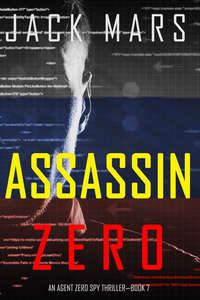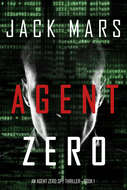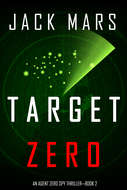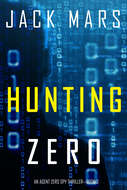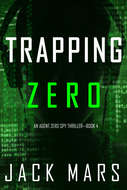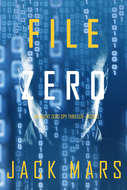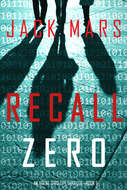Kitabı oku: «Assassin Zero», sayfa 3
CHAPTER FOUR
Jonathan Rutledge did not want to get out of bed.
It was, to be fair, a terrific bed. Fit for a king, as well as king-sized—although, he mused to himself in those early morning hours, perhaps it would be more fitting to call it president-sized.
He groaned as he rolled over and instinctively reached for the empty spot beside him. Strange, he thought, how he still stuck to his side of the bed even when Deidre was out of town. He was astounded by how quickly she had taken to her new position; currently she was on a circuit through the Midwest, lobbying for funding of art and music programs in public schools, while he pushed his face further into a down pillow as if it might drown out the sound that he knew was coming any moment.
And with that, the phone at his bedside rang again.
“No,” he told it. It was Thanksgiving Day. The only things on his schedule were to pardon a turkey, pose for some photos with his daughters, and then enjoy a nice, private meal with them. Why were they bothering him at the crack of dawn on a holiday?
A sharp knock at the door startled him. Rutledge sat up, rubbed his eyes, and asked loudly, “Yes?”
“Mr. President.” A female voice floated to him through the thick door of the White House master suite. “It’s Tabby. May I come in?”
Tabitha Halpern, his Chief of Staff. She couldn’t be bringing good news this early, and definitely not coffee.
“If you have to,” he muttered.
“Sir?” She hadn’t heard him.
“Come in, Tabby.”
The door swung open and Halpern entered, dressed smartly in a navy blue pantsuit with a crisp white blouse. She took two brisk steps inside and then paused just as suddenly, casting her gaze at the carpet, seemingly uncomfortable standing over the president while he was still lying in bed in silk pajamas.
“Sir,” she told him, “there’s been an… incident. Your presence is required in the Situation Room.”
Rutledge frowned. “What sort of incident?”
She seemed hesitant to say. “A suspected terror attack in Havana.”
“On Thanksgiving?”
“It occurred late last night, but… technically yes, sir.”
Rutledge shook his head. What sort of deviants planned an attack on a holiday? Unless… “Tabby, does Cuba celebrate Thanksgiving?”
“Sir?”
“Never mind. Is there time for coffee?”
She nodded. “I’ll have some brought up immediately.”
“Great. Tell them I’ll be there in twenty minutes.”
Tabby turned on a heel and marched out of the bedroom, closing the door behind her and leaving Rutledge grumbling under his breath about the injustice of it all. At long last he swung his bare feet out of the bed and stood, stretching and groaning again and wondering, for what must have been the ten thousandth time, how he had ended up living in the White House.
The technical answer was a simple one. Five weeks earlier Rutledge had been the Speaker of the House—and a damned good one at that, if he could say so himself. He had gained a reputation over his political career as a man who could not be bought, who stuck to his moral code and did not sway from his beliefs.
But then came the news of former President Harris’s involvement with the Russians and their plan to annex Ukraine. With the incontrovertible evidence of an interpreter’s recording, impeachment proceedings went dizzyingly fast. Then, with minutes to midnight before Harris’s definitive ousting, the president threw a hopeful Hail Mary for a reduced sentence by implicating his own VP. Vice President Brown folded like a lawn chair, pleading no contest to having knowledge of Harris’s involvement with Kozlovsky and the Russians.
It happened in the span of a single day. Before Rutledge had even finished reading the transcript of Brown’s testimony, Harris’s impeachment was approved by the Senate, and the VP resigned with a trial pending. For the first time in US history, the third man in line, the Speaker of the House, would take the seat in the Oval Office—Democrat Jonathan Rutledge.
He didn’t want it. He had assumed that leading the House of Representatives would be the pinnacle of his career; he’d held no aspirations to go any higher than that. And he could have stated those four little words that would have made all the difference—“I decline to serve”—but in doing so he would have been letting down his entire party. The President Pro Tempore of the Senate was a Republican from Texas, about as far right on the political spectrum as one could go in the democratic system.
And so Speaker Rutledge became President Rutledge. His next step would have been to nominate a vice president and have Congress vote them in, but it had been four weeks since his inauguration and he hadn’t done so yet, despite mounting pressure and criticism. It was a very careful deliberation to make—and after what the last two administrations had done, there weren’t exactly people lining up around the block for the job. He had someone in mind, the sharp California senator Joanna Barkley, but his time in office thus far had been so tumultuous that it seemed controversy and scrutiny awaited him around every corner.
On any given day, it was enough to want to give up. And he was keenly aware that he could; Rutledge could nominate Barkley as his VP, get the vote of approval from Congress, and then resign, making Barkley the first female president of the United States. He could justify it by the whirlwind of events surrounding his rise to the office. He would be lauded, at least he imagined, for putting a woman in the White House.
It was tempting. Especially when waking to news of terror attacks on Thanksgiving Day.
Rutledge buttoned up a shirt and knotted a blue tie, but decided to forgo a jacket and instead rolled up his sleeves. An aide wheeled in a cart with coffee, sugar, milk, and assorted pastries, but he simply poured himself a mug, black, and carried it with him as two stoic Secret Service agents silently fell in step beside him as he strode toward the Situation Room.
That was just one more thing he had to get used to, the constant accompaniment. Always being watched. Never truly being alone.
The two dark-suited agents followed him down a flight of stairs and along a hall where three more Secret Service agents were posted, each nodding in turn and acknowledging him with a murmur of “Mr. President.” They paused outside a pair of oak double doors, one of the agents taking a post with his hands clasped in front of him while the other opened the door for Rutledge, granting him access into the John F. Kennedy Conference Room, a five-thousand-square-foot center of command and intelligence in the basement of the White House’s West Wing, known more commonly as the Situation Room.
The four people already present stood as he rounded the table to take a seat at its head. To his left was Tabby Halpern, and beside her, Secretary of Defense Colin Kressley. The Secretary of State and Director of National Intelligence were notably absent, having been sent to Geneva to speak to the UN about the ongoing trade war with China and how it might impact European imports. In their stead was CIA Director Edward Shaw, a severe-looking man whom Rutledge had never actually seen smile. And beside him was a blonde woman in her late thirties, professional but admittedly stunning. A glance at her slate-gray eyes lit a glimmer of recognition; Rutledge had met her before, at his inauguration perhaps, but he couldn’t recall her name.
How they all had assembled so quickly, dressed impeccably and so seemingly alert, was beyond him. Bright-eyed and bushy-tailed, as his mother used to say. Rutledge suddenly felt downright slovenly in his rolled shirtsleeves and loosely knotted tie.
“Please, have a seat,” Rutledge said as he lowered himself into a black leather chair. “We want to give this matter the attention it deserves, but there are places we’d all rather be today. Let’s get right into it.”
Tabby nodded to Shaw, who folded his hands atop the table. “Mr. President,” the CIA director began, “at 0100 hours last night, an incident occurred in Havana, Cuba, specifically near the northern harbor shore in an area called the Malecón, a popular tourist spot. In a span of approximately three minutes, more than one hundred people experienced an array of symptoms, ranging from dizziness and nausea to permanent hearing loss, vision loss, and, in one unfortunate case, death.”
Rutledge stared blankly. When Tabby had said a suspected terror attack, he’d assumed a bomb had gone off or someone had opened fire in a public place. What was all this about symptoms and hearing loss? “I’m sorry, Director, I’m not sure I follow.”
“Sir,” said the blonde woman beside him. “Deputy Director Maria Johansson, CIA, Special Operations Group.”
Johansson, right. Rutledge suddenly recalled meeting her, as he had thought, the day of his inauguration.
“What Director Shaw is describing,” she continued, “is indicative of an ultrasonic weapon. This sort of concentration on a limited area in such a finite period of time creates parameters narrow enough for us to assume this was a targeted attack.”
That did little to explain anything to Rutledge. “I’m sorry,” he said again, feeling like the dunce of the room. “Did you say ultrasonic weapon?”
Johansson nodded. “Yes, sir. Ultrasonic weapons are typically used as nonlethal deterrents; most of our Navy’s ships are outfitted with them. Cruise ships use them as defense against pirates. But based on what we know happened in Cuba, what we’re seeing is much larger in scale and more potent than what our military employs.”
Tabby cleared her throat. “The police in Havana collected reports from at least three eyewitnesses who claim to have seen a group of masked men loading a ‘strange object’ onto a boat in the aftermath of the attack.”
Rutledge rubbed his temples. An ultrasonic weapon? It sounded like something out of a science fiction movie. It never ceased to amaze and confound him the creative ways humans dreamed up to hurt and kill each other.
“I assume you don’t believe this is an isolated incident,” Rutledge said.
“We would love to assume so, sir,” said Shaw. “But we simply can’t. That weapon and the people behind it are out there somewhere.”
“And the nature of this attack,” Johansson picked up, “appears random. We can’t discern a motive to target Havana or a tourist destination other than ease of access and escape, which in a case like this generally indicates a testing ground.”
“A testing ground,” Rutledge repeated. He had never served in the military, nor had he ever been employed in intelligence or covert operations, but he was fully aware what the deputy director was suggesting: this was the first attack, and there would be others. “And I suppose I should also assume that some of the victims were American.”
Tabby nodded. “That’s correct, sir. Two suffered permanent blindness. And the lone casualty was a young American woman…” She consulted her notes. “Named Megan Taylor. From Massachusetts.”
Rutledge was not prepared to deal with this. It was bad enough that he hadn’t yet nominated his vice president, a decision he had been floundering on because he didn’t trust himself not to resign immediately. It was bad enough that he was under a microscope, from not only the media but practically the entire world, because of the indiscretions of his two predecessors. It was bad enough that China’s new and seemingly irrational leader had sparked a trade war with the US by imposing ever-climbing tariffs on the massive amount of exports manufactured there, which was forecast to cause leaping inflation and, in the long term, potentially destabilize the American economy.
It was bad enough that it was Thanksgiving, for Christ’s sake.
“Sir?” Tabby prodded gently.
Rutledge hadn’t realized he’d been lost in his own head. He snapped out of it and rubbed his eyes. “All right, brass tacks: do we have reason to believe the United States might become a target?”
“Currently,” said Director Shaw, “we should operate under the assumption that the US will be a target. We can’t afford not to.”
“Any intel on who’s behind this?” Rutledge asked.
“Not yet,” Johansson said.
“But this doesn’t quite fit the MO of any of our Middle Eastern friends,” offered General Kressley. “If I was a betting man, I’d put hard cash on the Russians.”
“We can’t make any sort of assumptions,” said Johansson firmly.
“Given our recent history,” Kressley argued, “I’d call it an educated guess.”
“We are an intelligence agency,” Johansson fired back across the table, even wearing a thin smirk as she did. “And as such, we’ll gather intelligence and work on facts. Not guesses. Not assumptions.”
Rutledge found himself very fond of the slight blonde woman who refused to back down from a scowling four-star general. He turned to her and asked, “What do you propose, Johansson?”
“Our top engineer is currently devising a method of tracking this sort of weapon. Based on Havana, I would say the perpetrators are most likely to stay close to the water and target a coastal area. With your approval, sir, I’d like to send a Special Ops team to find them.”
Rutledge nodded slowly—a CIA operation sounded far more preferable than sounding the horn on the potential for an attack. Keep it small, keep it quiet, he thought. Then an idea came, sudden as an actual light bulb coming to life.
“Johansson,” he asked, “one of your agents was the guy that cracked the Kozlovsky affair, yes? He found the interpreter and retrieved the recording?”
Johansson was oddly hesitant, but she nodded once. “Yes, sir.”
“What was his name?”
“That would be… well, his call sign is Zero. Agent Zero, sir.”
“Zero. Right.” Rutledge rubbed his chin. “Him. I want him on this.”
“Um, sir… he’s not quite field-ready at this time. He’s transitioning back to operations work.”
The president didn’t know what that meant, but it sounded like an excuse or a euphemism to him. “It’s your job to make him ready, Deputy Director.” There was no swaying him now; Rutledge knew that this was the right call. The agent had singlehandedly rescued former President Pierson from assassination, and uncovered the secret pact between Harris and the Russians. If anyone could find the perpetrators and this ultrasonic whatever-it-was, it was him.
“If I may,” Johansson said, “the CIA has one of the very best trackers in the world at our disposal. A former Ranger, and a highly decorated agent in his own right—”
“Great,” Rutledge interrupted, “send him too. As soon as possible.”
“Yes sir,” Johansson acquiesced quietly, staring down at the tabletop.
“Is there anything else?” he asked. No one spoke, so Rutledge rose from his seat, and the four others in the Situation Room stood as well. “Then keep me updated, and, uh… try to enjoy the holiday, I suppose.” He nodded to them and strode out of the conference room, where the two Secret Service agents instantly fell in step with him.
Always being watched. Never truly alone.
Actually, he realized, he was wrong about that. In the moment it felt quite the opposite—no matter how many people were around him, advising him, protecting him, prodding him in one direction or another, he did feel truly alone.
CHAPTER FIVE
Zero woke to sunlight filtering through the blinds, warm on his face. He sat up and stretched his arms, feeling well rested. But something wasn’t right; this bedroom was bigger than it should have been, yet familiar. Instead of a single bureau opposite him there were two, one of them shorter and topped with a mirror.
This was not his condo in Bethesda. This was his bedroom from New York—their bedroom, in the house that they shared. Before… before everything.
And when he slowly turned his head he saw, impossibly, that she was there. Lying beside him, the comforter pulled halfway up her torso, sleeping peacefully in a white tank top as she so often did. Her blonde hair was arranged perfectly on the pillow; there was a light smile on her lips. She looked angelic. Carefree. Peaceful.
He smiled and settled back down on the pillow, watching her sleep. Noting the perfect contours of her cheeks, the slight dimple in her chin that Sara had inherited. His wife, the mother of his children, the greatest love of his life.
He knew this wasn’t real, but he wished it could be, that this moment could go on forever. He reached for her and gently touched her shoulder, running his fingertips along her smooth skin, down to the elbow…
He frowned.
Her skin was cold. Her chest was not rising and falling with breath.
Not sleeping. Dead.
Killed by a lethal dose of tetrodotoxin, administered by a man Zero had called a friend, a man that Zero had let live. A decision he regretted every day.
“Wake up,” he murmured. “Please. Wake up.”
She did not stir. She wouldn’t, ever again.
“Please wake up.” His voice cracked.
It was his fault that she died.
“Wake up.”
It was his fault she was murdered.
“WAKE UP!”
Zero sucked in a breath as he sat bolt upright in bed. It was a dream; he was in his bedroom in Bethesda, white walls and plain with only one bureau. He wasn’t sure if he had actually shouted or not, but his throat was hoarse and a powerful headache was coming on.
He groaned and checked his phone for the time as he came around to reality. The sun was up; it was Thanksgiving. He had to get out of bed. He had to get the turkey in the oven. He couldn’t dwell on a nightmare, because that would mean dwelling on the past, and dwelling about…
About…
“Oh my god,” he murmured under his breath. His hands trembled and his stomach turned.
Her name. He couldn’t remember her name.
For a long moment he sat like that, his gaze darting around the bedspread as if the answer was going to be written there on its surface. But it wasn’t there, and it didn’t seem to be in his head either. He could not remember her name.
Zero tore the blankets off of him and practically fell out of bed. He dropped to his hands and knees and reached underneath it, pulling out a fireproof security box the size of a briefcase.
“Key,” he said aloud. “Where’s the damn key?” He scrambled to his feet again and tore open his top dresser drawer, nearly pulling it out completely. He snatched up the small silver key that laid there, amongst balls of socks and curled belts, and flopped to the floor again as he unlocked the security box.
Inside was an assortment of important documents and items—among them his and the girls’ passports, his birth certificate and Social Security card, two pistols, a thousand dollars in cash, and his wedding ring. He pulled all of those out and made a small pile on the floor, because none of them were what he was looking for. He paused briefly on a picture, a photo of the four of them in San Francisco one summer, when Maya was five and Sara was three. The woman in the photo was completely familiar; he could hear her playful laugh in his head, feel her breath on his ear, the warm touch of her hand in his.
“What’s her goddamn name?!” His voice wavered as he tossed the photo aside and kept digging. It had to be in here. A lot of his things were still in Maria’s basement, but he was certain he would have put it in the security box…
“Thank god.” He recognized the manila envelope and tore the flap opening it. There was a single sheet inside, printed on thick stock and embossed with the stamp of a New York court. Their marriage license.
His throat ran dry as he stared at the name. “Katherine,” he said to himself. “Her name was Katherine.” But there was no relief in it; he felt only terror. The name did not register any memories in him or familiarity. It was like a foreign word on his tongue. “Katherine,” he said again. “Katherine Lawson.”
Still it didn’t sound right, even though it was printed right there in front of his eyes in black and white. Had she been Katherine? Had he called her Katherine? Or maybe it was…
“Kate.”
The air rushed out of him in an enormous sigh. Kate. He called her Kate. The memories rushed back, as sudden as a faucet turning on. Now there was relief, but still it was underscored by the very real fact that for those few harrowing minutes, he had absolutely forgotten his wife’s name—and that was not something he could write off as an arbitrary lapse.
Zero grabbed his cell phone and scrolled through his contacts. International charges be damned; he needed answers. Switzerland was six hours ahead. It would be early afternoon there, assuming their office was open.
“Pick up,” Zero pleaded. “Pick up, pick up…”
“Dr. Guyer’s office.” The female voice that answered the call was soft, tinged with a Swiss-German accent. He would have thought it sultry had he not been panicking.
“Alina?” he asked quickly. “I need to speak with Dr. Guyer, it’s very important—”
“I’m sorry,” she said, “may I ask who’s calling?”
Right. “It’s Reid. I mean, Kent. Kent Steele. Zero.”
“Ah, Agent Steele,” she said brightly. “How wonderful to hear from you.”
“Alina, it’s urgent.”
“Of course.” Her demeanor changed on a dime. “I’ll get him for you, hold a moment.”
Dr. Guyer was a brilliant Swiss neurologist, likely among the best in the world—and also the man who had installed the rice-grain-sized memory suppressor in Zero’s head four years earlier, which had wiped his memory clean of any affiliation with the CIA. But Guyer had been acting upon Zero’s own request, and later he was also the doctor who performed the procedure that restored his memory, albeit belatedly.
The two of them had been in contact on and off over the last year; the doctor had been delighted to learn that Zero’s memories had returned and eager to run further tests, but that required a trip to Switzerland, which Zero hadn’t had the time or energy to do—though he fully admitted he owed it to him. Nevertheless, if anyone could tell him what was happening in his head, it was Guyer.
“Agent Steele,” said a deep voice through the phone, accented and somber enough to suggest they were going to skip the pleasantries. “Alina said you sounded distressed. What seems to be the trouble?”
“Dr. Guyer,” Zero said. “I need help. I’m not sure what’s happening, but…” He paused as another horrid thought struck him. What if this wasn’t a private call? What if someone was listening in? The CIA had tapped his personal lines before. And if they heard all this…
You’re being paranoid. Don’t become that person again.
Even so, once the thought was in his head, he couldn’t shake it. It was best to err on the side of caution, after all. He’d just made his way back into the CIA, and it felt good. Like his life had purpose again. If they heard about this, things could change very quickly for him—and he didn’t want to fall back into the listless, fifteen-month depressive episode he’d found himself in before.
“Agent Steele? Are you still there?”
“Yes. Sorry.” Zero did his best to keep his voice even and casual as he said, “I’m, uh… having some trouble remembering things.”
“Hmm,” said Guyer thoughtfully. “Short-term or long-term?”
“I would say more of the long-term.”
“And you believe this to be of… concern?” Guyer was choosing his words carefully. Zero wondered if the doctor was thinking the same thing, that their call might be monitored. Someone like Guyer could face a world of trouble for what he’d done—certainly lose his medical license, if not actually face jail time.
“I would say that I think I should schedule that trip to see you sooner than later,” Zero told him.
“I see.” Guyer fell silent, and in that pregnant pause Zero became certain that the doctor was being as careful as he was. “Well, it so happens that you’re in luck. You won’t have to come to me; I’m attending a conference next week at Johns Hopkins in Baltimore. I can see you then. I’m sure that one of my colleagues will allow me use of an examination room.”
“Perfect.” Finally some semblance of relief came. He trusted that the doctor would know what to do—or at least be able to explain what was going on in his head. “Text me the details, and I’ll see you then.”
“I shall. Adieu, Agent Steele.” Guyer hung up, and Zero sat heavily on the edge of the bed. His hands were still shaking, and his bedroom floor was a mess of strewn nostalgia.
Maybe it was just a fluke, he told himself. Maybe the dream rattled me and it was just a brief bout of waking forgetfulness. Maybe I panicked for nothing.
Of course he didn’t truly believe any lie he might tell himself.
But despite whatever was happening in his head, life had to go on. He forced himself to stand, to pull on a pair of jeans and a shirt. He replaced the items back into the security box, locked it, and pushed it under the bed.
In the bathroom he brushed his teeth and splashed some cold water on his face before heading down the hall to the kitchen—just in time to see Maya closing the oven door and setting the digital timer.
Zero frowned. “What’s this?”
She shrugged and pushed the sweeping bangs from her forehead. “Just putting the bird in the oven.”
He blinked. “You’re cooking the turkey? Is that something they teach you at West Point?”
Maya smirked. “No.” She held up her phone. “But Google does.”
“Well… okay then. Guess I’ll just get myself some coffee.” He was again pleasantly surprised to find that she’d already made a pot. Maya had always been as independent as she was intelligent, but this almost seemed to him as if she was trying to pull some weight around. He couldn’t help but wonder if she was feeling as helpless about Sara’s situation as he was; maybe this was her way of showing support.
So he decided to stay out of her way and let her do what she would. He took a stool at the counter and stirred his coffee, trying to push the morning’s unpleasantness out of his mind. A few minutes later Sara trudged her way into the kitchen, still in pajamas, eyes partially open, her red-blonde hair tousled.
“Morning,” Maya said cheerfully.
“Happy Thanksgiving,” Zero chimed in.
“Mmph,” Sara grunted as she dragged herself to the coffee machine.
“Still not a morning person, huh, Squeak?” Maya ribbed gently.
Sara grunted something else, but he saw the hint of a smile on her lips at the sound of her childhood nickname. He felt a warmth inside him that wasn’t just the coffee; this was a feeling he had lacked for some time, the feeling of truly being at home.
And then, naturally, his cell phone rang.
The screen showed him that it was Maria calling and he winced. He had forgotten to text her the time and address to come today. Then he panicked all over again; it wasn’t like him to forget something like that. Was this another symptom of his ailing limbic system? What if he hadn’t actually forgotten, but it had been pushed out, just like Kate’s name had?
Calm down, he commanded himself. It’s just a little absentmindedness, nothing more.
He took a breath and answered the phone. “I am so sorry,” he said immediately. “I was supposed to text you, and it completely slipped my mind—”
“That’s not why I’m calling, Kent.” Maria sounded somber. “And I’m the one who should be sorry. I need you to come in.”
He frowned. Maya noticed and mirrored his expression as he rose from the stool and sought the relative privacy of the adjacent living room. “Come in? You mean to Langley?”
“Yes. I’m sorry, I know the timing couldn’t be worse, but we have a situation and I need you in this briefing.”
“I…” His first instinct was to refuse outright. Not only was it a holiday, and not only was he still dealing with Sara’s recovery, but Maya was visiting for the first time in a long time. Throw in an ample helping of terrifying memory loss and Maria was right; the timing couldn’t be worse.
He almost blurted out, “Do I have to?” but held his tongue for fear of coming off as petulant.
“I don’t want to do this any more than you do,” Maria said before he could think of any way to refuse. “And I really don’t want to pull rank.” Zero read that part loud and clear; Maria was reminding him that she was his boss now. “But I have no choice. This isn’t coming from me. President Rutledge asked for you personally.”
“He asked for me?” Zero repeated dully.
“Well, he asked for ‘the guy that cracked the Kozlovsky case,’ but close enough…”
“He could have meant Alan,” Zero suggested hopefully.
Maria chuckled halfheartedly, though it came out as barely more than a breathy sigh. “I’m sorry, Kent,” she said for the third time. “I’ll try to keep the briefing short, but…”
But this means I’m being sent into the field. The subtext was plain as day. And worse, there was no excuse or defense he could give to turn it down. He was under the CIA’s thumb for what he’d done, now more than ever—and he couldn’t very well say no to the president, who was for all intents and purposes his boss’s boss’s boss.
“Okay,” he relented. “Give me thirty minutes.” He ended the call and groaned softly.
“It’s all right.” He spun quickly to find Maya standing behind him. The condo wasn’t big enough for him to actually take the call privately, and he was certain she could ascertain the nature of the conversation even hearing only his side of it. “Go, do what you have to do.”
“What I have to do,” he said plainly, “is be here with you and Sara. It’s Thanksgiving, for crying out loud…”
“Apparently not everyone got the memo.” She was doing the same thing he tended to do; attempt to diffuse the situation with gentle humor. “It’s okay. Sara and I will take care of dinner. Get back when you can.”
He nodded, grateful for her understanding and wanting to say more, but ultimately he just murmured “thank you” and headed to his bedroom for a change of clothes. There was nothing more to say—because Maya knew just as well as he did that his day would be much more likely to end on a plane than it would sharing Thanksgiving with his daughters.
